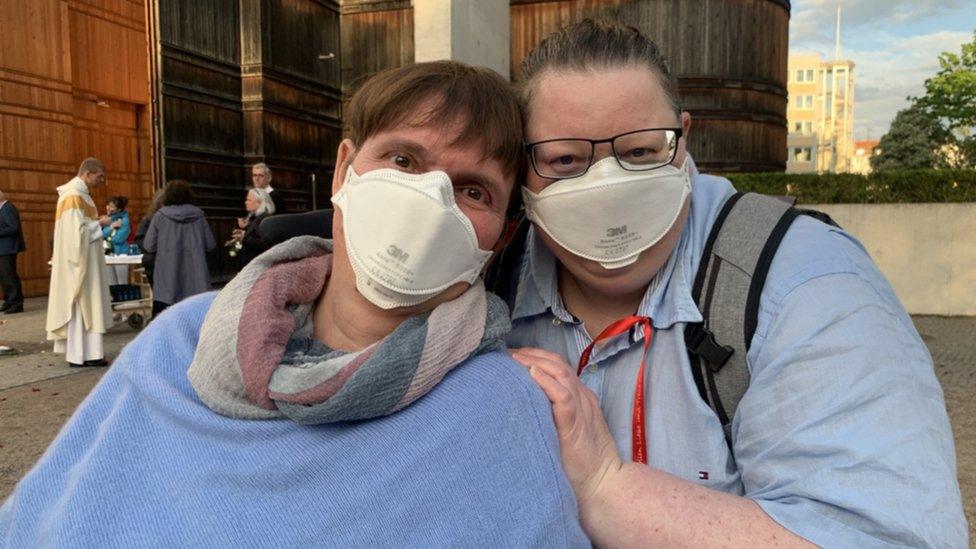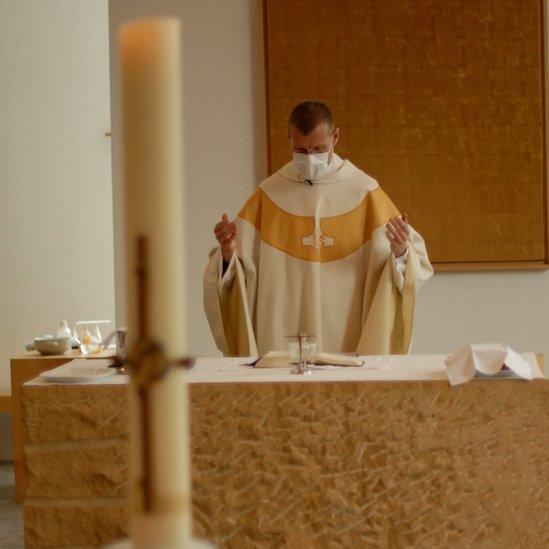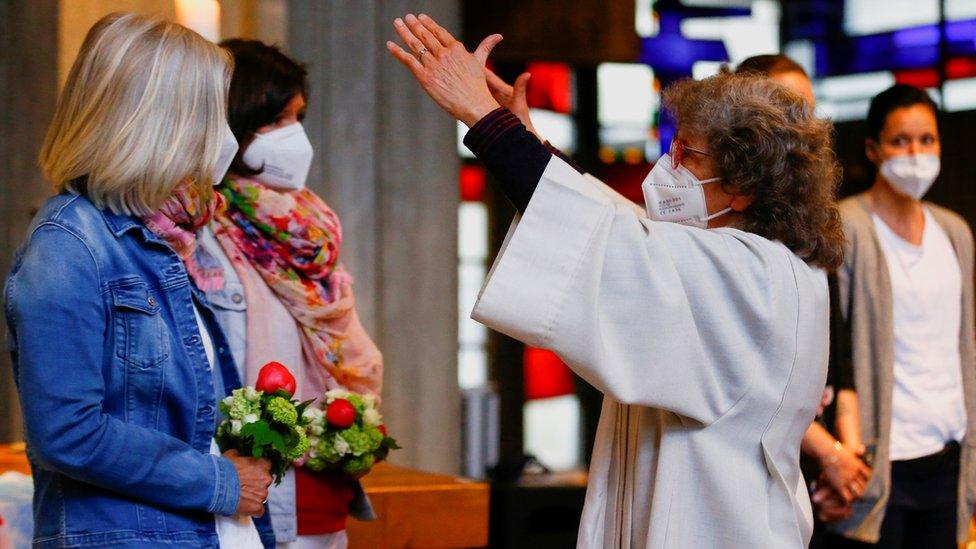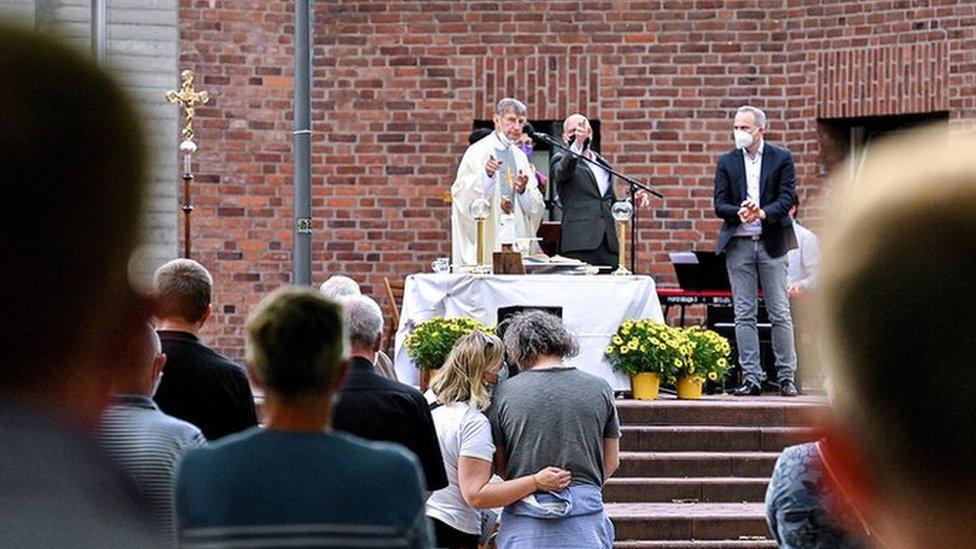Germany's quiet Catholic rebellion on gay blessings and women preachers
- Published

Frieda (L) and Sangha for years felt unaccepted by the Church
The church bells fade away, the organ starts playing and Father Jan Korditschke walks up to the altar to say Mass. It all looks like a very ordinary Sunday Catholic service.
But there's a feeling of nervous anticipation in the air. Something very unusual is about to happen.
Fr Korditschke says that anyone who would like to receive a blessing should stand up. Most of the congregation stand, including about a dozen same-sex couples. As harp music plays, the priest moves through the church, quietly asks those standing what they would like prayed for. Then he raises his hands over bowed heads and whispers an individual prayer.

Fr Korditschke is one of some 120 German priests who defied the ban on blessing same-sex unions
Many have tears in their eyes. That's because for the lesbian and gay Catholics here, after a lifetime in the Church, this is the first time they have felt fully accepted.
"It's very painful and I notice how wounded I feel," says Sangha, a practising Catholic all her life, who's here with Frieda, her partner of 25 years.
"For 49 years I have not been welcome. But finally people are starting to say: it's OK that you're here."
How the Vatican shocked liberal Catholics
For Matthias, who was also born Catholic and received a blessing with his partner Thomas, going to Mass has never been a problem. But statements from Catholic officials have made him consider leaving the Church.
"I have often wondered whether I can stay in a Church that doesn't want me. But the 'real' Church here, on the ground, restores my faith again."
Ironically it was one such official statement that led to today's service. In March the Vatican released a stern pronouncement, calling same-sex unions "sinful" and reiterating a ban on priests giving blessings to same-sex unions.
This is something individual, liberally minded priests sometimes do - but until now rarely in public.

In this ceremony, a pastoral worker blessed a same-sex couple in Cologne
The Vatican's blunt statement shocked liberal Catholics in Germany. In response thousands of parish priests, nuns and parishioners launched a campaign, called Liebe gewinnt (Love Wins), to publicly make clear that LGBTQ people are welcome in their churches.
"I felt anger, and shame, because I think it was a very hurtful statement," Fr Korditschke told me. He is one of around 120 priests in Germany who decided to publicly defy the Vatican's ban.
'How can you not bless someone in mourning?'
Over the space of a week the priests conducted services in Catholic churches all over Germany with individual blessings for anyone who wanted them, including couples in relationships the Vatican regards as sinful, such as divorced people or same-sex couples.
When I asked Fr Korditschke how he justified going against the Vatican's ruling, he answered with tears in his eyes.
There was someone in his congregation who had put a rose on the seat beside him for his partner who died a few months before; he had spoken of the pain he was in and had asked for a blessing for his deceased partner, to help him bear the loss.
How can you not bless - sorry, I'm getting emotional - a person in mourning after a long-term relationship? Should I say you should be grateful you got rid of this sinful love?

Blessings for same-sex couples are just part of a growing movement in Germany of liberal Catholics who want change.
Women in the pulpits
Grassroots organisations, such as Maria 2.0, also call for equal rights for women in the Church.
A day after Fr Korditschke's service in Berlin, women preached from the pulpits of 12 different Catholic churches across Germany -something the Vatican also frowns on.
"The Church used to say the Earth was flat and told us we had to believe that. The Church had to change its position. Or you were supposed to believe that Adam and Eve were real people," says Ulrike Göken-Huismann, who delivered a sermon in her church in Düsseldorf. "It is just not the case that the Church never changes its teaching."
If it is clear today that men and women are truly equal, that my brain is not smaller than yours, why should the Church then not say, yes, women can also become priests?

The German Church hierarchy is divided: liberal German bishops support some calls for reform, while conservative Church leaders back the Vatican's tough line.
However, surveys indicate that individual German Catholics themselves tend to be more liberal than the Catholic establishment.
One survey, carried out by universities in Berlin and Münster, suggests that 70% of German Catholics support blessings for same-sex couples, 80% have no problem with couples living together outside of marriage and 85% believe priests should be able to marry.
After the same-sex blessings in Berlin, around 100 people gather outside the church, to drink a celebratory glass of sparkling wine in the sun.
But at the church gates, about 10 protesters hold up a sign reading "God does not bless sin".
There is no animosity between the two groups but they are both vocal parts of the Catholic Church with very different opinions.
That's OK too, says Fr Korditschke with a smile.

What the Pope has said on homosexuality
October 2020: Pope Francis tells a documentary-maker same-sex couples should be allowed to have "civil unions". "Homosexual people... are children of God and have a right to a family. Nobody should be thrown out or made miserable over it."
October 2014: Bishops at the Church synod drop proposals for wider acceptance of gay people that were backed by the Pope.
July 2013: On a flight the Pope tells reporters that gay people should not be marginalised but integrated into society. Gay clergymen should be forgiven and their sins forgotten, he said.
"If a person is gay and seeks God and has good will, who am I to judge?"
2013: In the book On Heaven and Earth, the Pope says legally equating same-sex relationships to heterosexual marriages would be "an anthropological regression".
2010: As Archbishop of Buenos Aires he opposes same-sex marriages in law but supports some legal protections for same-sex couples.
- Published10 May 2021
